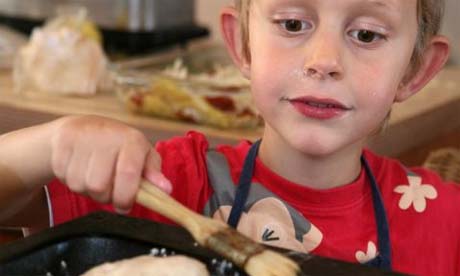
Britain's obesity epidemic transcends class because for the first time in history a large number of people of all incomes cannot cook, Jamie Oliver told MPs at Westminster yesterday.
Appearing in front of the select committee on health inequalities, the 33-year-old chef said the nation's health crisis was nothing to do with class or money, but "knowledge". He called on the government to invest £6.5bn in food education over the next decade - 10 times the amount it has stumped up so far to improve school dinners.
He pointed out what he said were flaws in the government's plans to teach primary school children to cook, and said it was "a bloody disgrace" that no more than 5,000 of the nation's 125,000 dinner ladies had so far been trained in healthy eating.
He warned the panel of an "incredibly profound" health crisis caused by poor nutrition, and called for controls on the fast food industry to counter the commercial influences pushing people to eat unhealthily. Local authorities should be more strict when granting planning permission to takeaway outlets, he said.
Oliver also offered his services to help the government appoint a food tsar.
"Why isn't there a minister of food?" he asked the panel. "Why isn't there someone from the private sector all over this like a rash? Why haven't we got one person driving this for the next 10 years?"
After the session, Oliver told journalists that he would not accept the job himself, as he felt he could be more effective "being on the periphery" than "inside". But he offered to headhunt someone for the job.
During the hearing, Oliver rejected the notion that poor eating was a class issue. "There are plenty of City boys who earn - well, used to earn - a lot of money who can't nourish their kids, even on a gold card," he said. "I can tell you it is categorically not about money or time. It's about knowledge."
The economic downturn loomed large over the session. Oliver said whereas in the past when money was short people knew how to make nutritious, fresh meals cheaply, there was now a "generation of young parents" who were nervous about raw ingredients and could not cook.
"In this fifth-richest country in the world ... there is a new poverty that I have never seen before. This isn't about fresh trainers or mobile phones or Sky dishes or plasma TV screens - they've got all that. It is a poverty of being able to nourish their family, in any class.
"This is the first time in British history that we have a large number of people who cannot cook."
The answer, he said, was getting people cooking from a young age. He welcomed the government's plans to teach cooking in primary schools. But he said many haven't been trained. And as Ofsted had no plans to assess the cookery classes, how would the government keep tabs on whether they were working? And who was going to pay for the new facilities? Plus, he added, those few home economics teachers still working were a "very sad, depressed, demoralised workforce" and needed to be shown "a lot more love".
He also said that the School Food Trust, the body set up in 2005 with £15m of government funding to improve the quality of food in schools, needed more support. He praised the trust, but said that as "they are still a government quango they can't always tell the truth ... they can't be as outspoken as I can; they can't be a pain in the arse like I can be".
He also criticised local authorities for being too slow to retrain dinner ladies. That only 4,000 or 5,000 of the country's 125,000 dinner ladies had been trained since 2005 could be a "deal breaker" for the healthy eating curriculum, he said.
Though Oliver welcomed the £650m the government pledged in 2005 to improve food in schools, he said it wasn't enough. Using an analogy of opening a restaurant, he said current funds were "only enough to do the windows", and that 10 times more money is needed over the coming decade.

